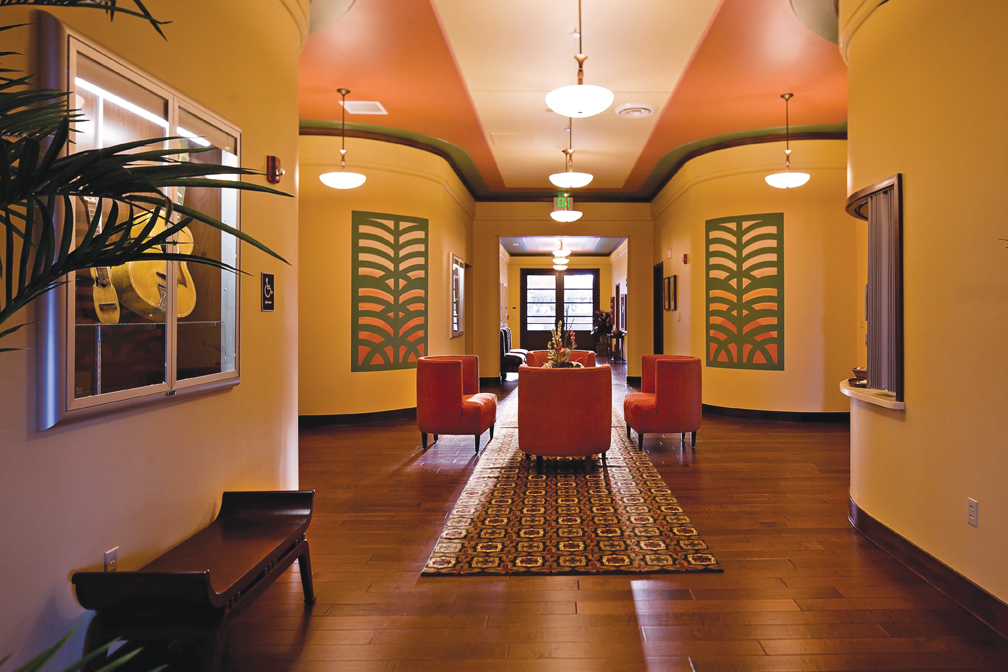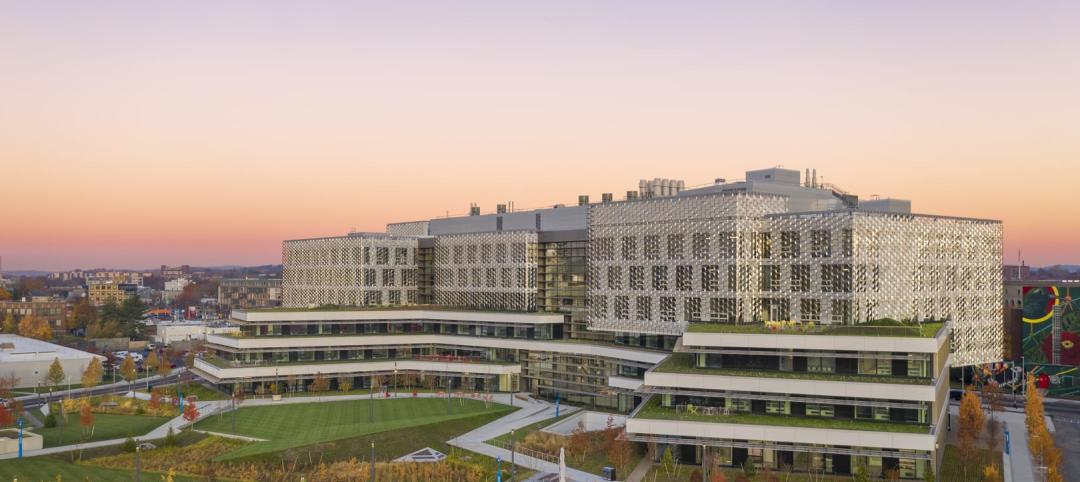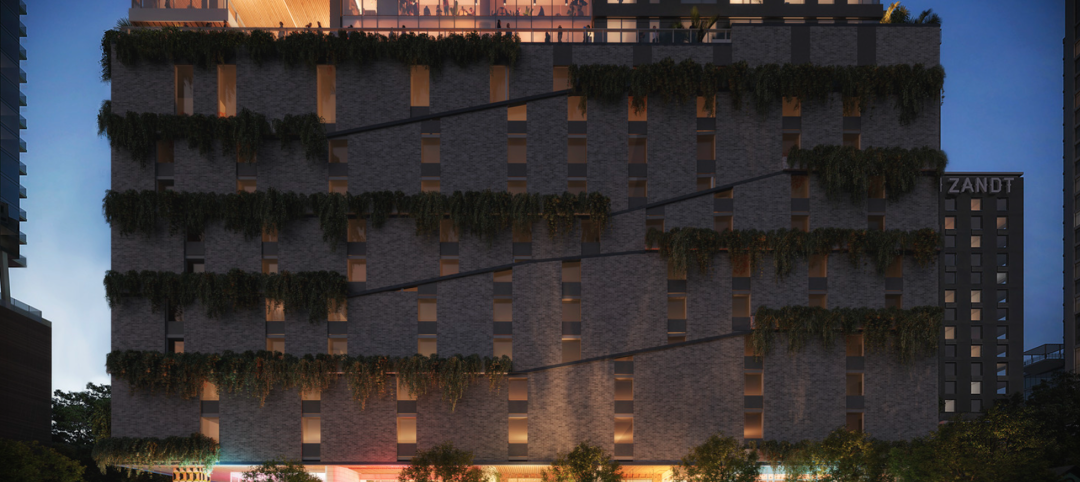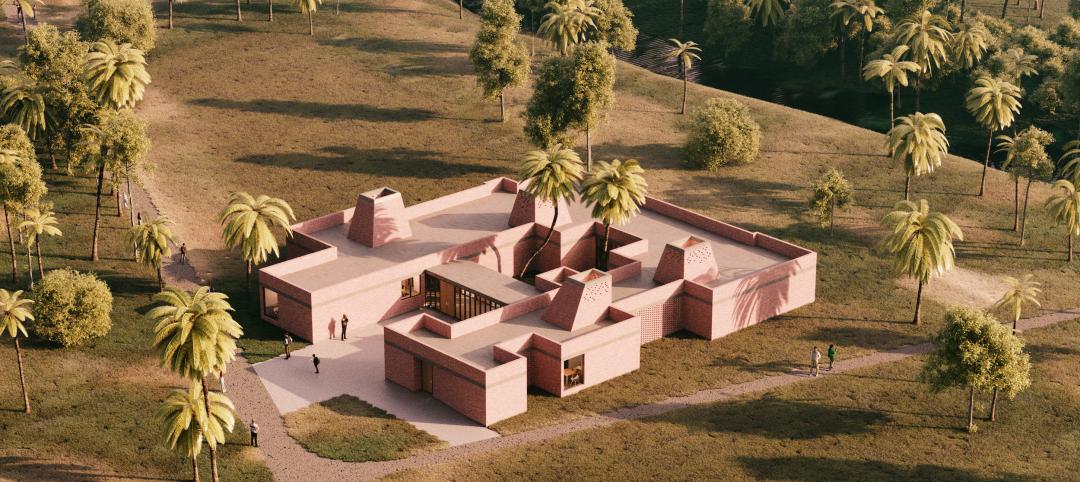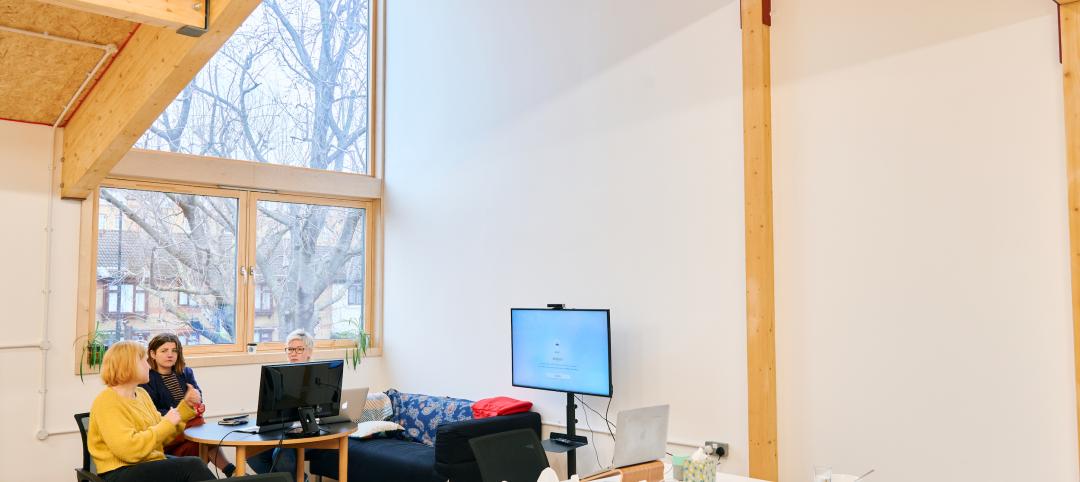The U.S. Air Force’s Joint Base Harbor-Hickam in Honolulu, Hawaii, is currently in the midst of an $820 million housing privatization project that includes the delivery of 1,208 new homes, 438 rehabilitated historic homes, housing and maintenance offices, two community centers, and a recreational sports complex.
At the heart of the project by developer Hickam Communities, Honolulu, Hawaii, is the reconstruction of the former Non-Commissioned Officer’s Mess Building (NCO Club), now known as the Ka Makani Community Center.
In 1935, Captain Howard B. Nurse designed the neighborhood master plan for Hickam, which included the NCO Club as a gathering place for noncommissioned officers and their spouses for rest and recreation.
Designed by Jozef B. A. Van Oort, a Dutch architect who came to Hawaii in 1935 and served as a chief architect of the U.S. Army Quartermaster Corps Construction Services, the single-story, cross-shaped concrete building is replete with Art Deco and Moderne details as well as with prominent Hawaiian tropical elements.
PROJECT SUMMARY
Ka Makani Community Center
Honolulu, HawaiiBuilding Team
Submitting firm: Lend Lease
Owner/developer: Hickam Communities LLC
Architect/architectural engineer: Mason Architects Inc.
Structural engineer: Shigemura, Lau, Sakanashi, Higuchi & Associates Inc.
MEP engineer: Lincolne Scott Inc.
General contractor/construction manager: KPRS Hawaii Construction Inc.
Construction/program manager: Lend LeaseGeneral Information
Size: 9,191 sf building
Construction cost: $5.6 million
Construction period: June 2009 to March 2011
Delivery method: Design-build
“Deco ornamentation is present in the large fluted column within the entry lanai and Moderne details are evident in the wide-radius corners,” says Julianne Polanco, director of cultural resources, Lend Lease, Schofield Barracks, Hawaii. “The building’s hip roof, wide roof overhangs, and large wood-framed sliding windows and doors are common to the Hawaiian-tropical style, as are the screened lanai, acid-stained concrete floors, and patterned concrete stamping.”
SUBTRACTION BY ADDITION
Over time, several additions–– a large, warehouse-like ballroom, a new kitchen, a laundry facility, mechanical equipment, even a barber shop––were made. The NCO Club ballooned in size to 26,000 sf, ultimately obscuring its cross-shape design.
Eventually, the building’s two lanais were permanently closed, the ceilings were lowered, the walls were covered with faux wood paneling, floors were carpeted, and the roof was covered with asphalt.
As the Hickam Communities’ rehabilitation project gained steam in 2009, it was evident that the former NCO Club, which had been abandoned for 15 years, should be rehabilitated as a community center and focal point of the housing development.
RETURNING TO THE ORIGINAL FOOTPRINT
The Building Team used Van Oort’s original drawings as a basis for the reconstruction of the NCO Club. However, there were still details that had yet to be discovered. “While we had an understanding of what was and was not the original building, it was the condition of the materials hidden by various upgrades and additions that remained unknown until construction commenced,” says Polanco.
All of the post-1941 additions to the exterior were removed, reducing the footprint of the building back to the original 10,000 sf. The lanai and dining terrace were reopened, original entry lanai light fixtures were refurbished and reinstalled. The original ceiling in the former lounge was exposed, revealing open beams with articulated wood molding painted in teal and gold. Faux wood paneling and lowered ceilings were removed, exposing portions of several large historic murals that were nearly destroyed by the previous alterations.
“The murals, hidden behind the additions to the building, were revealed. Unfortunately, the condition of the murals was such that they could not be retained or restored. As homage to their existence, the interior now has a few small decorative painted elements. The reintroduction of folding glass panel doors and the lanais were two elements that returned the building to its original charm,” says Polanco.
The general floor plan was retained, although some modifications were made to meet current needs. For example, the lounge became a multiuse room; the dining room was enlarged to become the entertainment room; the former card room was transformed into a fitness center; and the bar evolved into a computer room.
New wood flooring was installed in the main lobby and in the former lounge. The stone-line patterned acid-stained concrete floors in the old dining rooms were also restored to what Polanco calls “their original glory.”
“The retention of the concrete floors and other character-defining features allows visitors to share the same experience as visitors of the past,” says Polanco.
In addition being honored with a Silver Award in Building Design+Construction’s 2011 Reconstruction Awards, the Ka Makani Center has also won a Preservation Honors Award from the Historic Hawaii Foundation. It is also eligible for listing in the National Register of Historic Places.
“The rehabilitation of this building has been a success on many levels,” says Polanco. “From an aesthetic standpoint, the building has been returned to its rightful place as a graceful and pleasing focal point to the intentionally designed historic district.” +
Related Stories
AEC Tech Innovation | Apr 27, 2023
Does your firm use ChatGPT?
Is your firm having success utilizing ChatGPT (or other AI chat tools) on your building projects or as part of your business operations? If so, we want to hear from you.
Concrete Technology | Apr 24, 2023
A housing complex outside Paris is touted as the world’s first fully recycled concrete building
Outside Paris, Holcim, a Swiss-based provider of innovative and sustainable building solutions, and Seqens, a social housing provider in France, are partnering to build Recygénie—a 220-unit housing complex, including 70 social housing units. Holcim is calling the project the world’s first fully recycled concrete building.
Multifamily Housing | Apr 21, 2023
Arlington County, Va., eliminates single-family-only zoning
Arlington County, a Washington, D.C., community that took shape in the 1950s, when single-family homes were the rule in suburbia, recently became one of the first locations on the East Coast to eliminate single-family-only zoning.
Architects | Apr 21, 2023
Architecture billings improve slightly in March
Architecture firms reported a modest increase in March billings. This positive news was tempered by a slight decrease in new design contracts according to a new report released today from The American Institute of Architects (AIA). March was the first time since last September in which billings improved.
Green | Apr 21, 2023
Top 10 green building projects for 2023
The Harvard University Science and Engineering Complex in Boston and the Westwood Hills Nature Center in St. Louis are among the AIA COTE Top Ten Awards honorees for 2023.
Multifamily Housing | Apr 19, 2023
Austin’s historic Rainey Street welcomes a new neighbor: a 48-story mixed-used residential tower
Austin’s historic Rainey Street is welcoming a new neighbor. The Paseo, a 48-story mixed-used residential tower, will bring 557 apartments and two levels of retail to the popular Austin entertainment district, known for houses that have been converted into bungalow bars and restaurants.
Design Innovation Report | Apr 19, 2023
Reinforced concrete walls and fins stiffen and shade the National Bank of Kuwait skyscraper
When the National Bank of Kuwait first conceived its new headquarters more than a decade ago, it wanted to make a statement about passive design with a soaring tower that could withstand the extreme heat of Kuwait City, the country’s desert capital.
Design Innovation Report | Apr 19, 2023
HDR uses artificial intelligence tools to help design a vital health clinic in India
Architects from HDR worked pro bono with iKure, a technology-centric healthcare provider, to build a healthcare clinic in rural India.
Design Innovation Report | Apr 19, 2023
Meet The Hithe: A demountable building for transient startups
The Hithe, near London, is designed to be demountable and reusable. The 2,153-sf building provides 12 units of business incubator workspace for startups.
Metals | Apr 19, 2023
Sherwin-Williams Coil Coatings releases new color forecast for architectural metal coatings
The Coil Coatings division of Sherwin-Williams has released its latest color forecast, FUSE, for architectural metal coatings. The report aims to inspire architects, product manufacturers and original equipment manufacturers (OEMs) in the coil and extrusion market over the next 3-5 years and beyond.


